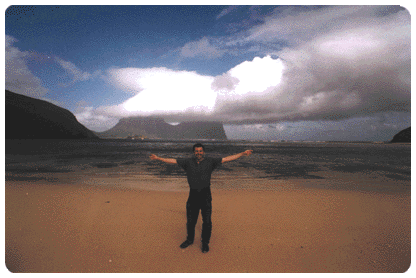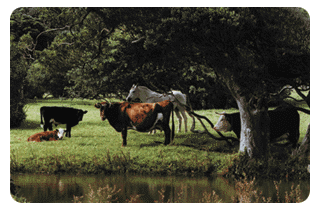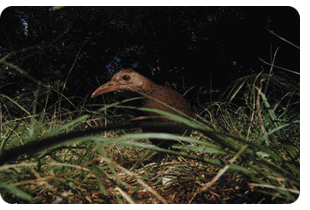HILE A PASSING tropical squall drummed upon
the tin roof of his house by the Lord Howe Island lagoon, outback guide Ray Shick stepped
out onto the extravagantly green lawn and gave hints about bushcraft. "If you wave your arms
or clap your hands like this, those birds will come down from the sky and land at your feet,"
he said as he nodded towards some Providence Petrels circling next to the cliffs above.
"Sometimes you can even pick them up," he added. I did not believe him until he brought out
photos of himself holding a wild petrel by the wingtips.
 To a science and environmental journalist from the States
such as myself, Ray was a fount of information about life on this pristine, sparsely populated,
Manhattan-sized chunk of Australia and the effort to protect it from large-scale development.
("We were greenies before anyone else," said the proprietor of a nearby lodge.) After an
afternoon spent listening to tales of island men lost at sea and the secrets of harvesting Kentia
palm nuts -- Howea forsteriana seedlings are the island's major export -- I
headed to my bicycle. Through the palm fronds and banksia flowers I could see the surf
crashing into the sides of 2,887-foot-tall Mount Gower.
To a science and environmental journalist from the States
such as myself, Ray was a fount of information about life on this pristine, sparsely populated,
Manhattan-sized chunk of Australia and the effort to protect it from large-scale development.
("We were greenies before anyone else," said the proprietor of a nearby lodge.) After an
afternoon spent listening to tales of island men lost at sea and the secrets of harvesting Kentia
palm nuts -- Howea forsteriana seedlings are the island's major export -- I
headed to my bicycle. Through the palm fronds and banksia flowers I could see the surf
crashing into the sides of 2,887-foot-tall Mount Gower. "A year ago I was researching
toxic waste sites in Queens," I thought to myself. "I wouldn't be here if it weren't for that
Fulbright."
At the end of World
War
II, a victorious United States found itself with a huge surplus of war matériel. An
Arkansas congressman proposed selling the leftover trucks, tanks, and jeeps and using the
money "to increase mutual understanding between the people of the United States and the
people of other countries by means of educational and cultural exchange" -- the origin of the J.
William Fulbright Foreign Scholarships.
In setting up the program, Sen. Fulbright drew upon his own youthful experience as a Rhodes
scholar at Oxford; he once said, "The best way to
appreciate another's viewpoints, their beliefs, the way they think, and the way they do things
 is to interact with them directly on an individual basis -- work with them, live with them,
teach with them, learn with them, and learn from them." Or, as he wrote in his autobiography,
"It is hard to shoot someone you know."
is to interact with them directly on an individual basis -- work with them, live with them,
teach with them, learn with them, and learn from them." Or, as he wrote in his autobiography,
"It is hard to shoot someone you know."
Since 1946, more than 70,000 Americans and 130,000 foreigners have participated from 130
countries. Illustrious former Fulbrighters include composer Philip Glass, actor Stacy Keach, Columbia
University
scientist Nancy Wexler, novelist John Updike, and Secretary General of the United Nations Boutros Boutros-Ghali. The
Fulbright takes in several types of scholarships under its umbrella, including teacher-exchange programs, grants to
attend
seminars (the Senior Scholar
program), and
funds to cover solely the costs of overseas travel. Out of all the Fulbrights, the Full Grants, also known as
postgraduate traveling fellowships, are most in demand. They provide for everything from
round-trip transportation to health and accident insurance. An average of 5,000 people per
year are accepted into the program worldwide; this figure includes travel grants, job
exchanges, Senior Scholars, and Full Grants for people from the United States and abroad.
The program's essential function is to enable regular citizens to pursue their work. The grants
have two goals: the research by recipients helps increase the worldwide trove of knowledge,
while the constant circulation of visiting scholars promotes cross-cultural understanding. Dr.
John Lake, director of the Australian Fulbright Commission, says each grantee has a
"multiplier effect" that ripples throughout the host community. (Australia was one of the first
countries to join the program.) "The educational component is a means as much as an end,"
Lake said recently. He adds that it has been relatively inexpensive, saying "We've invested 50
years in the program at a total cost to date of around $1.3 billion" -- about the price of one
B-2 bomber.
While snorkeling among the waters of Shark Bay, Western Australia, on the opposite end of the continent
from Lord Howe Island, I found
myself thinking about why I was here. I had wanted to see Australia's national parks firsthand
and observe their conservation efforts in order to see what America can learn from the
Australian experience. Through my project to use writing and photography to document the
Australian government's efforts at balancing conservation and local residents' economic
concerns, I also hoped to share my observations with the public. I had a personal interest in
the topic as well: As a college student, I'd worked as a seasonal employee and part-time
volunteer at Yellowstone, the world's first national park. At Shark Bay, the park concept
is taken one step further, and wild animals interact with human beings. It's unlike a
traditional preserve or zoo; as a ranger said, "We have to use our common sense and make it
up as we go along." Or, as the manager of a local tourist development put it, "There's a lot of
money riding on the back of those fish."
A splash behind me and a quick glimpse of a fin
startled me from my reverie. Unsure of what to expect -- this is called "Shark Bay" for good
 reason -- I looked beneath the waves and saw a wild
baby dolphin. The water was filled with
sound as "Hollikin," as he is known by wildlife biologists, dove and circled. I reached out to
touch him, but he disappeared into the blue.
reason -- I looked beneath the waves and saw a wild
baby dolphin. The water was filled with
sound as "Hollikin," as he is known by wildlife biologists, dove and circled. I reached out to
touch him, but he disappeared into the blue.
In all Fulbright fellowships, the choice of research topics is open to whatever interests the
applicant; in Australia this past year, American postgraduate fellows looked at everything from
the diet of brushtail possums to the implications of Aboriginal land claims.
There is also
room for serendipity, as Professor Kenneth T. Jackson of Columbia's history department discovered a few years
ago as a Senior Scholar. He was invited to give public lectures at Australian universities, and
while traveling over the land down under he became intrigued by all the lavish memorials to
"The Great War." He said: "I became fascinated by the Australian experience in World War I.
Indeed, I do not want to die before I go to Gallipoli and stare up at
the former Turkish positions and look at the individual graves of the ANZAC (Australia-New
Zealand Army Corps) forces." He called his Senior Scholarship "a terrific learning experience."
Not that there aren't adjustments, big and small, to make after arriving in a new country.
Suzanne Buchta, a postgraduate fellow studying the topological structure of DNA at Melbourne University, says: "The bagels here are
pretty pathetic, aren't they? That's one of the first things I will have when I return to my
parents' house in New York."
There are other differences as well, says Valerie Cass, a
postgraduate fellow from the University of California at
Irvine who is studying the Australian government's use of cooperative measures with
industry to reduce the emission of greenhouse gases into the atmosphere. Cass says Australia
has a "more sociable, softer approach" in general; as for pollution controls, the government has
incentives to reduce emissions but no penalties for polluting. As she phrases it, "There's a
carrot but no stick."
Cass found the general scholarly approach in her field in Australia
to be different as well, with "more theory and less testing." She thinks this may be  partly due to the fact that Australia has no Bill of Rights or
First Amendment, and the Freedom of Information Act is much less potent. As a result, "It's
harder to get documents on things like meetings and roundtables," she said. "When a new
government moves in, all the old administration's stuff is officially gone. It's declared 'Not for
Public Access' or 'Commercially Sensitive.'"
partly due to the fact that Australia has no Bill of Rights or
First Amendment, and the Freedom of Information Act is much less potent. As a result, "It's
harder to get documents on things like meetings and roundtables," she said. "When a new
government moves in, all the old administration's stuff is officially gone. It's declared 'Not for
Public Access' or 'Commercially Sensitive.'"
Senior Scholar Joan Jeffri, who directs the Research
Center for Arts and Culture at Columbia University, also finds differences in attitude
between the two countries. Jeffri, currently in Australia to research philanthropy and the
individual artist, and challenges in the arts community, says, "The situation is more complex
than it first appears." For example, she says American society has a more individualistic
emphasis, with a long history of private funding for the arts. Australia, on the other hand, has
a tradition of public support for the arts; this, in tandem with its stronger unions, higher
minimum wage, and universal health care, is part of the expectation that government should
give everyone "a fair go." The result, says Jeffri, is that "incentives for private giving have not
been fully developed and, therefore, artists are not as aggressive."
The sheer
size and emptiness of the outback may have an effect on the psyche -- Australia's population is
the same as the New York metro area's, but spread out over a landmass the size of the
continental United States. The resulting isolation may explain the Australian virtue of
"mateship" -- what sociologist Donald Horne described in his seminal work The Lucky
Country as "an easy readiness to strike up contact with fellow human beings in a warm
and casual way." Once you do encounter someone else in the middle of nowhere, you're eager
to socialize. This struck me after I was stopped for driving over the speed limit once in a
remote part of Western Australia. As soon as the policeman saw the words New York on my
driver's license, he couldn't stop asking about life in the city. He was fascinated by the idea of
subways and certain that everyone in Manhattan carried a gun. (Maybe he's right.) So, on the
side of the North West Coastal Highway, under a noonday Tropic of Capricorn sun, I found
myself describing life in the Big Apple. We had a nice, long conversation, and he let me go
with a warning about driving safely.
And a $50 fine.
|
Grantsmanship basics for aspiring Fulbrighters "Grad students can be
too clever for their own good," says Walter Jackson of the Fulbright administrative office. He
cites the time someone used a photocopier to shrink a proposal to fit the maximum allowed
size -- with the resulting type so tiny it was not legible. Jackson's role is to provide
guidance on navigating the application procedure, which he compares to the college
admissions process: After the initial form come interviews, rankings, screenings, approval by
the host country, and final selection by the Fulbright Foreign Scholarship Board. Jackson and
others recommend a few steps to raise one's chances of acceptance:
- Read the
application handbook. Jackson says budding Margaret Meads constantly apply to
study in Papua New Guinea, which, the handbook says, does not want any more
anthropologists. "Half the battle is just following the steps correctly," says postgraduate fellow
Valerie Cass.
- Take advantage of the competition statistics. For example,
nearly half the applicants to Canada received fellowships last year, while only 6 percent of the
candidates to the United Kingdom won awards. The chance of being accepted to lovely Albania is high: Only two people applied in all of
1994.
- Establish contact in the land you wish to visit. As Columbia's Joan
Jeffri puts it, "The best way to negotiate the application process, as far as I am concerned, is to
have someone request you!" Dean Robin Nagle, Fulbright Program Officer at New York University, affirms that evaluators favor
applicants who have a connection to an academic institution in the host country. "A letter of
affiliation is one of the best ways to have a proposal stand out," she said. Getting such a letter
is daunting but not impossible. I did it all via Internet, finding promising leads in my field by
downloading course catalogs from Australia, then tracking down the person in charge and
e-mailing a résumé and a description of my project. Eventually, I struck up a
rapport with a faculty member who mailed a four-sentence letter saying he would oversee my
work. (It all would have been difficult without e-mail: Airmail takes two weeks to reach the
land down under, while surface mail takes three months.)
- Define your project
clearly in the grant proposal.Eduardo Macagno,
who once evaluated students on behalf of the Fulbright and other international scholarship
programs, considers the applicant's written outline crucial. Macagno, now dean of the Graduate School of Arts and Sciences at
Columbia, recommends straightforward prose: "No complicated English that requires four or
five readings to get the idea." Macagno also recommends having a colleague critique the
proposal before submitting it. "Look over the university database of old applications that were
successful," he adds; these can give an idea of the structure of a winning grant.
- Don't sacrifice other commitments. One student applied simultaneously for
the Fulbright, Rhodes, Truman, and British Marshall Scholarships; with the resulting
workload, she says she barely avoided academic probation and was still awaiting word on
acceptances. -- Dan Drollette
|
DAN DROLLETTE is a free-lance science and
environmental writer in Australia on a Fulbright postgraduate traveling fellowship. He has
written for Science,
Australasian Science, Discovery
Channel Online, and other publications. PHOTO CREDITS: Dan
Drollette.



 is to interact with them directly on an individual basis -- work with them, live with them,
teach with them, learn with them, and learn from them." Or, as he wrote in his autobiography,
"It is hard to shoot someone you know."
is to interact with them directly on an individual basis -- work with them, live with them,
teach with them, learn with them, and learn from them." Or, as he wrote in his autobiography,
"It is hard to shoot someone you know."  reason -- I looked beneath the waves and saw a wild
baby dolphin. The water was filled with
sound as "Hollikin," as he is known by wildlife biologists, dove and circled. I reached out to
touch him, but he disappeared into the blue.
reason -- I looked beneath the waves and saw a wild
baby dolphin. The water was filled with
sound as "Hollikin," as he is known by wildlife biologists, dove and circled. I reached out to
touch him, but he disappeared into the blue. partly due to the fact that Australia has no Bill of Rights or
First Amendment, and the Freedom of Information Act is much less potent. As a result, "It's
harder to get documents on things like meetings and roundtables," she said. "When a new
government moves in, all the old administration's stuff is officially gone. It's declared 'Not for
Public Access' or 'Commercially Sensitive.'"
partly due to the fact that Australia has no Bill of Rights or
First Amendment, and the Freedom of Information Act is much less potent. As a result, "It's
harder to get documents on things like meetings and roundtables," she said. "When a new
government moves in, all the old administration's stuff is officially gone. It's declared 'Not for
Public Access' or 'Commercially Sensitive.'" 








